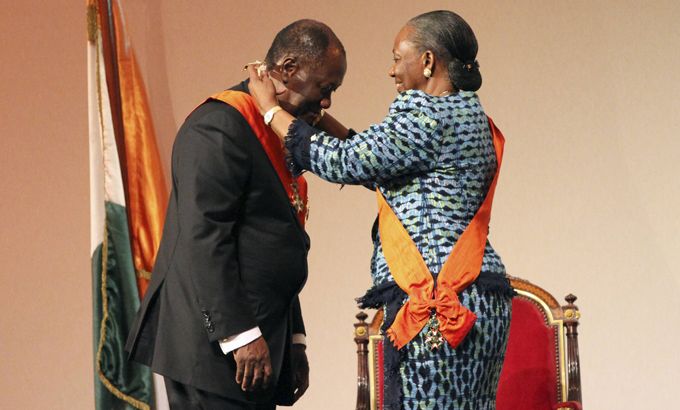Ouattara sworn in as Ivorian president
World leaders attend inauguration ceremony amid hopes for peaceful new chapter in West African country’s history.

Alassane Ouattara has been sworn in as Ivory Coast’s president in an inauguration ceremony attended by world leaders.
At least 100,000 people from across the region gathered in Yamoussoukro, the administrative capital, for Saturday’s ceremony, Al Jazeera’s Yvonne Ndege covering the event said, describing the atmosphere as “carnival-like”.
Ouattara singled out France’s president, Nicolas Sarkozy, who got a standing ovation for helping end the crisis.
“This day is a historic day for all Ivorians, and it marks a will to write a new page of history for Ivory Coast,” Ouattara said in a speech.
“The crisis is behind us,” he said. “It is the return of Ivory Coast into the international and African scene that we are celebrating today.”
A French-led military intervention ended a standoff between Ouattara and former president Laurent Gbagbo, who had refused to hand over power after losing last November’s election.
Al Jazeera’s Ndege said for many Ivorians the swearing-in ceremony “is an opportunity to begin a new chapter in the history of the country”.
“In 50 years of independence from France this country has known 30 years of dictatorship and 20 years of ongoing political crisis, meaning that it hasn’t really been able to assert itself as a democracy,” she said.
The ceremony should have taken place six months ago after Ouattara was declared the winner of the presidential election.
But he was prevented from taking office by outgoing president Gbagbo.
Gbagbo used the army to prevent Ouattara from leaving the hotel that had served as his campaign headquarters, forcing Ouattara to initially take the oath of office in a ceremony inside the hotel lobby attended only by his aides.
‘Formidable’ challenge
Gbagbo “did win 47 per cent of the vote during the presidential poll … [and] he continues to enjoy support,” Ndege said.
But she added: “There really is a hope that this ceremony will be the beginning of a new chapter for the Ivorian people … The question really is whether Alassane Ouattara will – once the pomp and ceremony is over – be able to pull it off.”
At least 3,000 people were killed and more than a million displaced in the post-election power struggle, which ended in April when Gbagbo was captured in a bunker at his residence where he was holed up with his wife.
Gbagbo is now under house arrest in Ivory Coast’s north and Ouattara wants him tried for human rights abuses during the conflict.
Human rights groups say both Ouattara’s and Gbagbo’s camps committed atrocities against civilians.
Ndege said opinion was divided in Ivory Coast, especially regarding the influence wielded by Paris on the local leadership.
“[Some feel that] France has had too much of a hand in putting Alassane Ouattara into power … The feeling among some people is that Ouattara is really France’s puppet in Africa,” Ndege said.
The UN’s Ban earlier said that though the Ivorian crisis was over, the UN and the international community still had challenges to deal with.
“There are serious challenges like national reconciliation, restoration of peace, and humanitarian affairs as well as accountability questions and impunity issues,” he said.